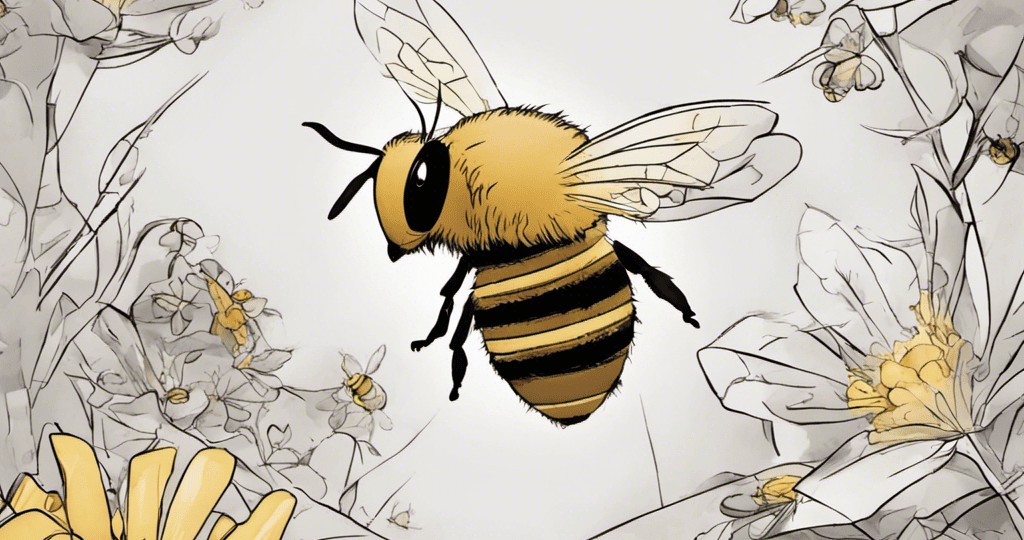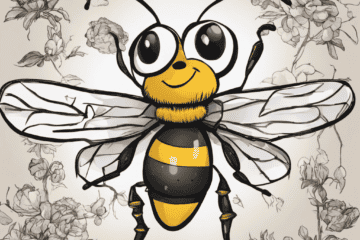Are bees important to our planet? Do we really need them? What would happen if bees ceased to exist?
The Bees
Although the black-yellow bees with stripes are more familiar to us, but you can find them in a variety of colors! Have you ever seen a green or a blue or a red one? Or one with a metallic sheen? Yes, they exist as well!

They also have different sizes. From tiny ones (less than two millimeters long) or very large ones (as large as a human thumb).
In my childhood, my father imparted a valuable lesson about respecting bees, so they, in turn, would show respect towards me. At the time, I was unsure how to navigate their presence, fearing their stings. I often found myself frozen in their presence, hoping they would depart peacefully.
Even now, there are moments when I react as if facing imminent danger, instinctively attempting to flee and protect myself. However, little did I realize that bees tirelessly contribute to the preservation of all life, including our own! They play a vital role in preventing our extinction, a fact that only recently dawned on me.
Bees are not only crucial for our ecosystem but also for our food supply and the well-being of our planet. This newfound knowledge has reignited the significance of my father’s words, prompting me to delve deeper into these fascinating, yet incredibly vital, creatures.
Why the existence of bees is important: 5 Reasons
Understanding the paramount importance of bees and acknowledging the imminent threat they face might just inspire us to alter our habits and take action to save them!
Consider this remarkable fact: 90% of all plants rely on cross-pollination to spread and flourish. In Canada, bees hold the title of the most critical pollinators, ensuring the health of various plant species.
However, the impact of climate change reaches far and wide, affecting not only the life cycle of plants but also the delicate balance of bees’ lives. As a result, some flowers bloom earlier or later than their optimal periods, leaving bees struggling to find sufficient sources of food. The consequences are dire for both the bees and our ecosystem as a whole.
1. Pollination
From sunrise to sunset, bees diligently visit flowers during the flowering period, which typically occurs in spring to early summer. During each trip, a bee collects either nectar or pollen, never both simultaneously. The bee’s body is covered in tiny hairs that inadvertently trap pollen. As the bee goes from one flower to another, it leaves behind traces of pollen.
These seemingly insignificant pollen grains play a crucial role in the flower’s reproductive process. When the bee visits the next flower, some of the pollen rubs off onto the stigma or the tip of the pistil, which is the flower’s female reproductive organ. This transfer of pollen to the stigma is known as pollination.
Through this natural process of pollination, the flower becomes fertilized, and the development of fruit-carrying seeds commences. Pollination is a fundamental mechanism in nature that ensures the continuation of plant species and the production of seeds for future generations.
The transfer of pollen from the flower to the stigma is called pollination.
2. Food Pyramid & Eco System
Beyond the well-known association with honey, bees play a critical role in supporting numerous crops. They are integral to the food pyramid, responsible for pollinating approximately 1 in 3 bites of the food we consume. Their importance extends far beyond just our plates; they are vital for the health and prosperity of countless ecosystems.
The United Nations Food and Agriculture Organization (FAO) recognizes the remarkable significance of pollinators, particularly bees, in ensuring food security and promoting sustainable farming practices. In fact, pollination by bees contributes immensely to our food supply, making it an essential factor in maintaining our nourishment.

In addition to filling our bellies, the substantial contribution of crop pollination by bees also bolsters economies worldwide. Each year, this natural process generates extraordinary amounts of millions or even billions of dollars, benefiting not only us but also our economies in significant ways. Bees are a cornerstone of the food chain and a vital component of a thriving ecosystem and economy.
Here’s a list of some of the crops that need the pollination of bees:
Alfalfa, Almonds, Apples, Asparagus, Beans, Beets, Blackberries, Blueberries, Brussels sprouts, Buckwheat, Cabbage, Cantaloupe, Cauliflower, Celery, Cherries, Chestnuts, Chives, Clover, Cranberries, Cucumber, Currants, Eggplant, Flax, Garlic,
Gooseberries, Grapes, Horseradish, Kale, Lettuce, Mustard, Onions, Parsley, Peaches, Pears, Plums, Pumpkins, Radishes, Raspberries, Rhubarb, Squash, Strawberries, Sunflowers, Sweet potatoes, Turnip, Watermelon, etc.
3. Economy
A big part of the global economy has to do with bees.

★ The annual global food production relies on the contribution of bees on a scale between $235 and $577 billion (!), with the greatest economic benefits seen in the Mediterranean, Southern and Eastern Asia, and Europe.
★ At least 90 commercial crops in North America are grown due to honeybees.
★ Globally, 87 of 115 evaluated food crops rely on pollinators, contributing 35% of global food production.
★ 80% of the worldwide almond production is worth 4.8 billion dollars annually.
So, if the bees disappear tomorrow, many parts of the global economy will collapse!
4. Medicines and Medical Products
How many times do most of us, when we are sick, drink a cup of tea with some honey? Or we consume a tiny amount of royal jelly to keep our health…
There are many bee – products that are used for medical purposes. Some examples are the following:
● propolis,
● bee bread
● bee pollen
● royal jelly
● beeswax
● bee venom
5. Environment Protection
Are you in search of a natural solution to combat soil erosion? Look no further, as bees play a crucial role in maintaining the fertility of the land.
Bees are an integral link in a vast chain of interconnected organisms. They are instrumental in the survival of numerous plant species, including flowers and trees. Without the tireless efforts of bees, many of these plants would vanish from our landscapes.
The consequences of losing bees would be far-reaching. Soil erosion would become a significant problem, resulting in over-fluctuating streams, eroded banks, and vulnerable shores. The wildlife that depends on these plants for sustenance would struggle to find food and face severe repercussions.
Furthermore, the natural healing process of the land after calamities like wildfires, floods, or drought would be severely impaired without the involvement of bees and their vital pollination services. Their work ensures that the flora can rejuvenate and restore the land to its former glory, making bees indispensable protectors of the environment.
Finally
In conclusion, my fellow readers, let’s pause and give heartfelt appreciation to the marvelous beings that grace our world – the bees. With their charming striped bodies and delicate wings, they hold the very key to our existence. Without bees, we’d undoubtedly find ourselves in quite a sticky situation!
These small yet mighty creatures are the unsung heroes of our planet, playing roles far beyond what meets the eye. From their tireless pollination efforts to their essential contributions to our food production, economy, and even our health, bees are an invaluable asset.
Their diligent work in transferring pollen from one flower to another ensures the growth of countless plant species, forming the foundation of our food pyramid. Remarkably, one in every three bites of the nourishment we savor daily owes its existence to their buzzing efforts.
But the significance of bees reaches far beyond our dinner plates. They contribute billions to our global economy, supporting industries and livelihoods worldwide. These remarkable insects provide us with precious medicinal products, and their absence would leave a significant void in our healthcare arsenal. Furthermore, bees play a vital role in preventing soil erosion and maintaining the delicate balance of our ecosystems.
Now is the time to draw inspiration from these buzzing ambassadors of nature and cherish our fuzzy friends. Their survival is intricately tied to our own. We must create bee-friendly environments, embrace sustainable farming practices, and raise awareness about the challenges they face.
Are you ready to join the cause and make a difference? Take action and discover “7+1 Ways to Save the Bees” – practical steps you can take in your daily life to support these incredible pollinators.
Together, we can shape a future where bees continue to thrive, and we, in turn, reap the boundless benefits of their vital presence. Let’s save the bees, one flower at a time!


